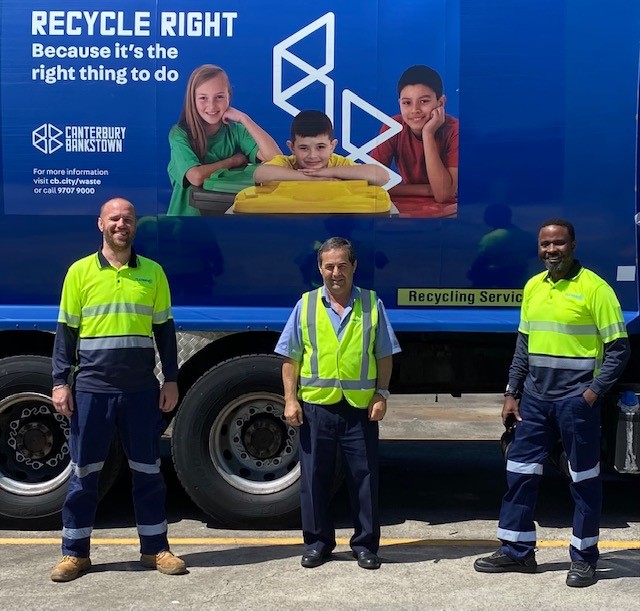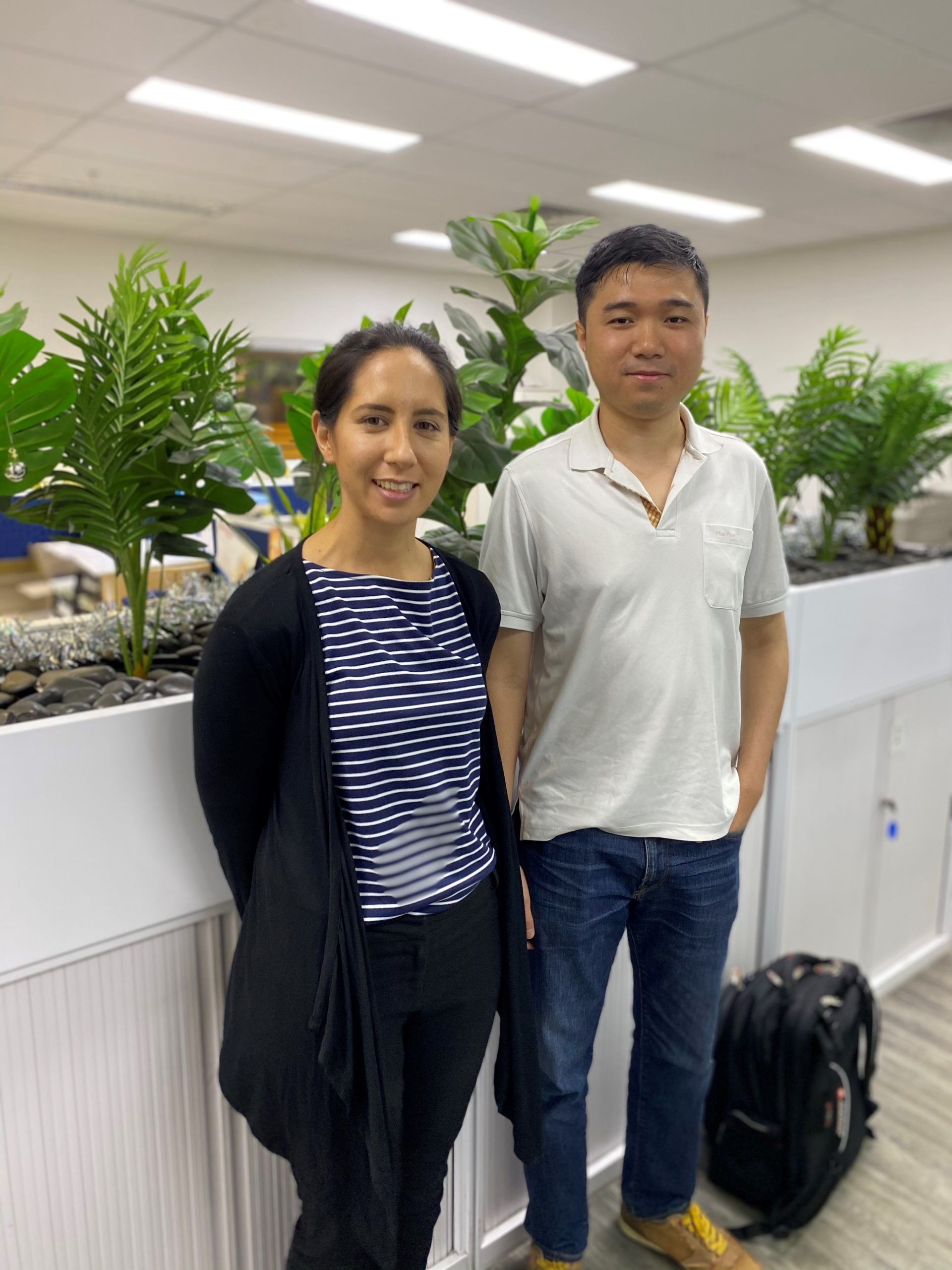My experience at Cleanaway is an example of how work-integrated learning can prepare a student for the workplace by acquiring transferable skills, learning the workplace culture and setting you up for success in a permanent role.
My experience at Cleanaway is an example of how work-integrated learning can prepare a student for the workplace by acquiring transferable skills, learning the workplace culture and setting you up for success in a permanent role.
In 2020, the NSW Education team welcomed two interns, Abiola (Ola) Ishola and Tu Thach, who were both completing a Master of Science in Innovation at Macquarie University.
Ola was inspired to join Cleanaway’s internship program after seeing a presentation given at the university by Rebecca Evered (Cleanaway’s NSW Sustainability Manager). He was assigned to the commercial and industrial (C&I) section of the team to complete his 270 hours of practical experience. Tu joined the internship program after hearing good things from Ola and got involved in projects such as waste assessments for different customers.
Following success in the internship program, Ola and Tu were both offered permanent roles in the Education team as resource recovery officers. We spoke to Ola and Tu to find out more about their experiences in the internship program and what it was like to transition to permanent roles.

Pictured: Abiola (far right) with Peter Tennant and Roy Mittiga

Pictured: Tu Thach (right) with Senior Education Officer Theresa Troup
What made you choose Cleanaway to complete your internship?
Ola: Cleanaway’s brand visibility played a part in my decision. Also, Rebecca’s articulation of Cleanaway’s WSERRC (Western Sydney Energy & Resource Recovery Centre) at a lecture at Macquarie University showcased the company’s forward-thinking approach to making a sustainable future possible.
Tu: I was introduced to this company by Ola. While undertaking our Master’s degrees, we were both looking for places to intern where we could build our experience in the environmental industry.
What was your experience like as an intern at Cleanaway? What were the highlights and the biggest challenges?
Ola: My internship experience exposed me to the various departments within Cleanaway as I toured several waste processing facilities. I had the opportunity to engage with the community on WSERRC, giving me an appreciation of the impact and scale of the project. I felt included and welcome as a part of the C&I team and learnt a lot from them.
Some of the highlights included participating in the Hornsby Shire Council recycling caddy roll out, conducting bin trims and audits at Coles DC, and participating in Clean Up Australia Day.
A major challenge during my internship was the disruption caused by the COVID-19 pandemic. The response by Cleanaway’s management was immediate and reassuring. It paved the way for the C&I team to be agile in adapting to the changing situations. I was able to collaborate across multiple projects to still complete my internship in a timely manner.
Tu: It was quite an eye-opening experience. I hadn’t paid much attention to the waste management industry before joining Cleanaway. The internship gave me a lot of insight into the unseen, complicated issues that Australia has with waste.
Overall, I had a great time learning new things thanks to the support and welcoming attitude of my team. I met a lot of interesting people from different departments.
What kind of support did you have as an intern?
Ola: I had access to all the training materials available through Cleanaway University, the internal training platform. I also had access to workmates, supervisors and managers who were willing to teach me a thing or two. Support was also available through weekly catch-up sessions with my supervisor, manager and the C&I team. This gave me an opportunity to review my tasks for the week and get assistance where it was required.
Tu: As it was my first time interning for a company in a foreign country, I was actually very nervous at the beginning, but everyone in my team was always very eager to help and show me their work. I got a lot of offers to follow my coworkers to learn how their job is done. There were also many opportunities to visit different departments and facilities run by Cleanaway.
How did you make the move into a full-time role and what made you want to stay on at Cleanaway?
Ola: During my internship exit interview I had indicated my willingness to take up a permanent role with Cleanaway. The sustainability manager also facilitated the move as we kept communicating after my internship. I was advised to apply for the role when it was eventually advertised.
The opportunity to deepen my understanding of waste recovery and the recycling industry was an attraction. The possibility of working across the different areas that had caught my interest, including health, safety & environment, liquid waste recycling, contaminated land reclamation, and WSERRC also played a part.
Tu: I brought up with my manager that I was interested in working full time at Cleanaway and wanted to be considered for any role. Two months after the internship, I received an email about the job offer.
I really love the working culture here. It’s very positive and progressive, and everyone is encouraged to be professional. I also believe this role will provide me with knowledge and skills necessary for my future career.
What was it like transitioning from an internship to a full-time employee role? Do you feel like your internship prepared you for the permanent role?
Ola: The internship adequately prepared me for a full-time role at Cleanaway. It exposed me to the workplace culture and Our Cleanaway Way – the compass guiding the company. It felt natural to transition into a permanent role with the company.
The discernable difference between the internship and permanent role is the pay. It is a good feeling getting paid doing what you love – ensuring the planet is livable for future generations through the actions we take today. Cleanaway is at the centre of taking those sustainable actions, and it is a pleasure to be a part of it.
Tu: I was very happy when I got the email offer for a position at Cleanaway. I think it was the most logical stepping stone after my graduation.
The internship prepared me quite well for the official position. Getting used to the company culture and, to a larger extent, the working culture in Australia has helped me integrate with everyone else. It definitely makes the job less overwhelming at the beginning. My job is more or less the same, but I get to meet even more people from the council and other departments.
Have you been able to apply skills learnt during study to your internship and current role?
Ola: Yes. There have been limited opportunities to apply some of the skills acquired during study in my current role. I believe that those skills will come to bear more in other roles I take up within the company in the future.
Tu: Some of it, yes. The thing is, this position requires me to constantly learn new stuff and update what I already know. Most of the time, I have to rely on my communication and management skills.
What advice would you give to graduates and soon-to-be graduates who are looking to get their foot in the door through an internship or graduate role?
Ola: Go for it! My experience at Cleanaway is an example of how work-integrated learning can prepare a student for the workplace by acquiring transferable skills, learning the workplace culture and setting you up for success in a permanent role.
Tu: I would advise them to expand their skill set outside of their academia. This includes conflict resolution, career planning and networking. During an internship, they should focus more on learning the industry and the people, rather than just their assignments. Most of the knowledge and skills post-graduation must be self-taught.
Would you recommend an internship at Cleanaway to someone else?
Ola: Absolutely! I have already recommended Cleanaway to two interns who have joined the C&I team – and that is just a start.
Tu: Of course!
Contact us to learn more about the amazing people who are making a sustainable future possible with Cleanaway.